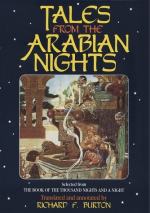The “Tale of Attaf” occupies pp. 10-50, and the end is abrupt. The treatment of the “Novel” contrasts curiously with that of the Chavis Ms. which forms my text, and whose directness and simplicity give it a European and even classical character. It is an excellent study of the liberties allowed to themselves by Eastern editors and scribes. In the Cotheal Ms. the tone is distinctly literary, abounding in verse (sometimes repeated from other portions of The Nights), and in Saj’a or Cadence which the copyist sometimes denotes by marks in red ink. The wife of Attaf is a much sterner and more important personage than in my text: she throws water upon her admirer as he gazes upon her from the street, and when compelled to marry him by her father, she “gives him a bit of her mind” as forcibly and stingingly as if she were of “Anglo-Saxon” blood; e.g. “An thou have in thee aught of manliness and generosity thou wilt divorce me even as he did.” Sundry episodes like that of the brutal Eunuch at Ja’afar’s door, and the Vagabond in the Mosque, are also introduced; but upon this point I need say no more, as Mr. Cotheal shall now speak for himself.
The Tale of Attaf.
Story of Attaf the generous, and what happened to him with the Wazir Ja’afar who fell in love with a young lady not knowing her to be the cousin-wife of Attaf who, in his generosity divorced her and married her to him. The Naib of Damascus being jealous of Attaf’s intimacy with Ja’afar imprisons him for treason and pillages his property. Escape of Attaf from prison and his flight to Baghdad where he arrives in a beggarly condition, and being accused of assassination is condemned to death, but being released he goes to Ja’afar who recognises him and is rewarded by him and the Caliph. His wife is restored to him and after a while they are sent home to Damascus of which he is appointed Wali in place of the Naib who is condemned to death, but is afterwards exiled.
In the name of God, the Merciful, the Compassionate, to whom we cry for help.
They say God is omniscient, knowing the past and the future, and we learn from the histories of the peoples that there was in ancient times and bygone seasons (and God knows best!) a Caliph of the Caliphs or the orthodox and he was Harun er-Rashid who one night became very restless and from the drowsiness that came upon him he sat down upon the bed and dressed himself in sleeping-clothes; then it was that he called




